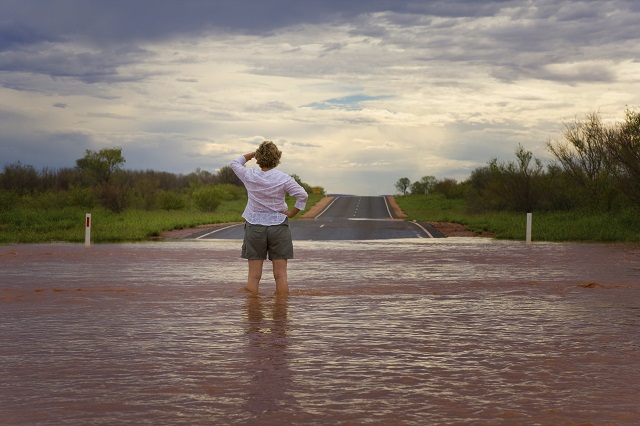
Credit: Michael Dunning / Getty Images
A migration crisis is already underway, and it's caused, at least in part, by climate change, according to modeling by ProPublica and the New York Times Magazine. Their expert analysis shows that without the proper preparation and political will, it will continue to worsen. Michael Oppenheimer, a professor of geosciences and international affairs at Princeton University, explains how the increasingly deadly combination of heat and humidity is driving people from their homelands. He predicts greater migratory build-ups along the US-Mexico border, in Southeast Asia, and on North Africa’s Mediterranean coast.
Even if we develop a strong response now, a “lack of foresight,” he argues, has brought us to our current reality: a certain level of climate change is already baked into the system for the next 30 years. Oppenheimer says governments must restructure their thinking around climate change to focus not just on emissions, but also extreme weather response.
Plus, we hear from three local reporters at our affiliate stations about the environmental challenges facing their cities. Houston Public Media’s Katie Watkins, WJCT’s Brendan Rivers in Jacksonville and KJZZ’s Ron Dungan in Phoenix, join us to discuss droughts, flooding, land use, and more.
Three Takeaways:
- While people in the U.S. still look at coastal cities as idyllic spots for vacation, retirement, and property investment, Oppenheimer argues that governments would be wise to incentivize inward migration instead. But make no mistake, inland communities will also feel the effects of climate change. For example, Oppenheimer notes that intense precipitation events have become “heavier and more common,” causing dam collapses in the middle of the country. And surprisingly, the hottest wet-bulb temperature (which measures heat and humidity’s effect on the body) recorded in the U.S. was in Appleton, Wisconsin, he says.
- We often think of wind turbines and solar panels as being our best solution to climate change. But they're only part of the picture. As Oppenheimer explains, climate change management at its core is “not an engineering problem,” rather it is a “human problem.” No amount of tactical engineering will solve this problem. Rather, Oppenheimer argues that to aptly prepare and respond to climate catastrophes, we will need to “reconceive” our relationship to the climate and muster the necessary political will. Specifically, he envisions structural regulation created around three types of coastal areas: one that is thoroughly protected, areas that can be adapted for a changing climate, and those from which we will have to withdraw.
- Since long-standing migration networks exist between the United States, Mexico, and Central America, Oppenheimer says we can eventually expect “a gradual increase in those flows” due to climate change. To prevent a migratory crisis on our southern border, Oppenheimer notes we will need to better incorporate climate change into U.S. foreign policy. Specifically, he argues that we will need to provide Central American countries with the foreign aid they need to mitigate climate change there. “We haven’t done enough of that in that area,” Oppenheimer says.
More Reading:
- In this Foreign Affairs piece, Oppenheimer discusses what it will mean for “people, infrastructure, ecosystems and society” when once-in-a-lifetime catastrophes turn into “annual debacles.”
- Read about the climate-induced migration happening between Honduras and the US. Brookings’ Sarah Bermeo and David Leblang describe the deadly confluence of climate and violence.
- “It's expensive to fight the sea,” this NPR piece writes. Check out California’s emerging plan for coastal homes at risk from rising seas.
- For more from Jacksonville’s Brendan Rivers, check out his podcast series from WJCT Public Media’s ADAPT, that explores climate change in Northeast Florida.
- In both Houston and Phoenix, climate change is bringing about high temperatures that are cause for concern. To read the latest on Phoenix’s drought and Houston’s heatwaves, check out Ron Dungan and Katie Watkins’ coverage.

